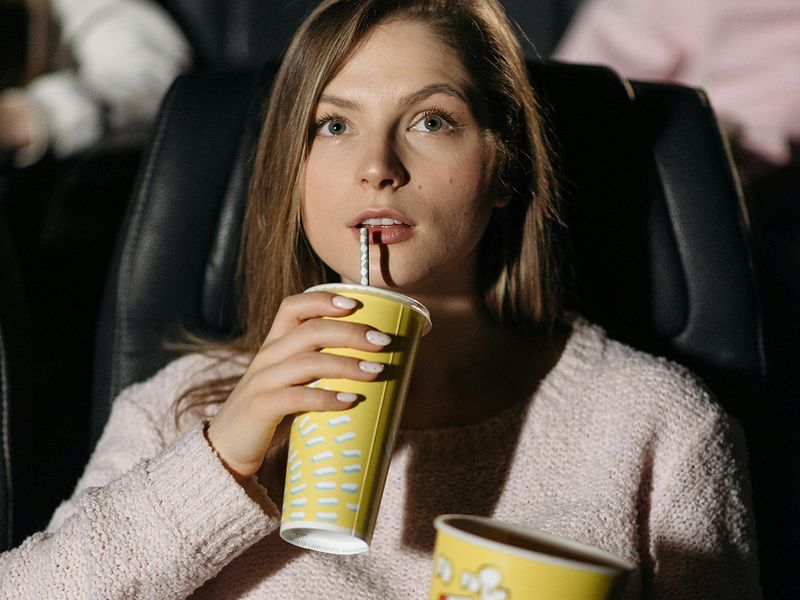
Whether it's gripping crime dramas, heartwarming romances, or adrenaline-packed action films with helicopter stunts and daring leaps from buildings, have you ever wondered what really gets your brain buzzing? According to a new study, your movie preferences might be more than just a source of entertainment — they could actually reveal deeper patterns in your brain activity.
Recently, researchers at Martin Luther University Halle-Wittenberg in Germany, delved into the minds of over 260 movie buffs, comparing their favorite genres to their brain responses to various emotional stimuli. According to the study published in Frontiers in Behavioral Neuroscience, fans of adrenaline-pumping action flicks and laugh-out-loud comedies might be wired differently than those who prefer documentaries or crime dramas. The former group showed a heightened sensitivity to negative emotions like anger and fear, while the latter seemed more emotionally resilient.
As Esther Zwiky, the lead psychologist of the study explained to the science news site, Neuroscience News, “Movies are like emotional mirrors. They not only portray human emotions but also trigger them within us." As the research concluded, people may choose movie genres that align with their desired level of emotional stimulation. This study sheds new light on the interplay between our brain and the films we love, offering a glimpse into the psychology of movie-watching.
As the psychologists explain, film-watching is far from a passive activity — it's a complex, brain-engaging experience driven by both our psyche and neurological circuitry.
The psychology behind movie-watching

Her Netflix page is filled with just crime procedurals, to the point where even her mother-in-law is slightly alarmed.
Dubai-based Sophia Alexander, a British expat and entrepreneur, tries to explain why she prefers to ‘unwind’ by watching crime dramas. “I love the intensely complicated films, the whodunnits, where you have to puzzle out who committed the crime and why,” she says. “I like keeping my mind busy with such procedurals, trying to figure out why people, innocent or guilty, behave the way they do in these shows and documentaries. I cannot handle too much gore, though.”
On the other hand, her husband steers clear of crime and horror. He prefers a brand of old-school comedy; it’s comforting and cheers him up after a long day at work. “He already says that life is stressful enough already; we need to at least find some semblance of peace,” she laughs.
So, why do we gravitate towards a particular genre? Alexandre Machado, a Dubai-based neuropsychologist explains, “Different movie genres evoke distinct emotions, and this emotional response is a central motivator while selecting a genre. For instance, action films typically provide a rather intense and stimulating experience for some, activating the sympathetic nervous system and leading to an adrenaline rush.”

Our entertainment choices, can reflect individual values, beliefs and traumas. For instance, people who identify with themes of innovation and questioning may be drawn to science fiction, while those with interests in social relationships may dominate romantic genres...
On the other hand, certain dramas evoke empathy and sadness, allowing the viewer to connect emotionally, he says. As Machado explains, psychological research is also attempting to show that these emotional reactions are associated with personality styles; individuals seeking strong emotions may prefer action and horror genres, while those valuing emotional connection and narrative may opt for dramas and romances.
Moreover, genre preferences are also tied to personal identity construction, as Machado explains. “Our entertainment choices, can reflect individual values, beliefs and traumas. For instance, people who identify with themes of innovation and questioning may be drawn to science fiction, while those with interests in social relationships may dominate romantic genres,” he says.
The neurological underpinnings of our genre selections

Beyond our personal experiences and emotions, our brain's neural pathways also influence our movie choices. So what really goes on in our brain when we choose a film to watch? Well, research might be limited, but current studies show that the choice of movie genres is closely related to various brain regions that play crucial roles in emotional processing and reward. The main areas involved include, according to Machado and Madiha Khan, a Dubai-based neuropsychologist:
Amygdala: This region is essential for detecting and responding to emotional stimuli. The amygdala is particularly sensitive to threats and fears, which explains the intense activation in response to horror or action films, which often present elements of danger and survival. Amygdala activation can facilitate the formation of emotional memories, influencing genre preferences by creating lasting associations with experiences of fear or excitement.
Nucleus Accumbens: This brain region is deeply rooted in the reward system, mediating the perception of pleasure and motivation. The activation of the nucleus accumbens is associated with feelings of pleasure and satisfaction, influencing the attraction to genres that provide gratifying experiences, such as comedies and romances. The positive reinforcement associated with these rewarding emotions may increase the likelihood of choosing the genre in future viewings.
Prefrontal cortex: This area is responsible for higher cognitive functions, including decision-making and emotional regulation. The prefrontal cortex helps people weigh the consequences of their cinematic preferences, establishing a balance between an immediate emotional response and a rational evaluation of the film's content. Regulating these emotions can be crucial for filtering genre choices that align more closely with personal values and interests.
Hippocampus: The hippocampus is crucial for the formation and retrieval of memories. A strong interaction between the hippocampus and the amygdala suggests that the emotional memory of viewers influences their genre choices. Positive memories associated with past films may facilitate a preference for genres that evoke similar emotions, reinforcing the choice over time.
As Machado and Khan explain, our preferences for film genres are the result of a complex interplay between psychological and neurobiological factors. Emotional aspects, such as the pursuit of excitement or comfort, along with personal identity and the need for escapism, play a fundamental role in deciding what to watch. Furthermore, specific brain regions, such as the amygdala and nucleus accumbens, are essential in processing these emotions, influencing how we react to different types of films.
Machado adds, the amygdala, with its focus on primary emotions such as fear and pleasure, drives the emotional response to films, while the nucleus accumbens encourages the pursuit of pleasurable experiences, reinforcing the choice of genres that appeal to the viewer. The prefrontal cortex, in turn, provides a key for emotional regulation and informed decision-making about what to watch, while the hippocampus assists in creating and retrieving memories that shape individual preferences.
As a result, studying our brain’s inner workings suggests that genre preferences are not random, but rather driven by a combination of emotional regulation, reward seeking, and memory formation.
How our life experiences, moods, align with our film choices

While the brain processes emotions and makes decisions, our life experiences and memories also play a significant role in shaping our genre preferences. For instance, traumatic, upsetting and harrowing experiences, exert a profound influence over our choices, often leading us to avoid or seek out genres that trigger, or evoke memories of those events.
This can manifest in several ways, explains Ramya Krishna, a Dubai-based psychologist. For instance, she cites how sometimes, people who have just suffered heartbreak, would prefer not to watch a cheery romantic comedy. Watching such a film triggers off rather intense and powerful emotions, even if it is an overall happy one. “This is a coping mechanism to protect themselves from emotional distress,” she adds. Films have a unique ability to tap into something fundamental within us, blending storyline, music, and sensory elements to evoke powerful emotions. At times, they can unexpectedly bring back memories we may have preferred to leave behind.
On the other hand, it can also evoke a sense of catharsis. Some people find relief, solace in watching films that feel therapeutic to them be it action or romance, as it allows them to process and understand their own experiences. “By identifying with characters who have gone through similar traumas, they may feel a sense of connection and validation,” explains Krishna. Moreover, some people might even look for films that trigger memories of traumatic events as a way to reprocess and understand them. “This is a rather risky strategy; it can lead to increased distress,” she says.
Our mood and mental states
Needless to say, our genre preferences are not set in stone.
As Krishna explains, while reflecting our own interests, beliefs and values, our choices of films are deeply personal and subjective to our emotional states at particular times. “I think our personalities are far too complex; it sounds rather simplistic to say ‘Oh he is an optimist so he loves goofy comedies and happy go-lucky films’. It’s about what stimulates our brain at a certain point. For instance, I love romance and comedies, more than any other genre: But sometimes, I just am not in the mood for it, for whatever reason. An action film might be what gets my brain stimulated at that time, and I might just be deeply invested in it. Maybe I really don’t want to see airport love confessions, instead, I want to watch people fighting on the roof of a train,” she says.
Explaining how our mood and mental state affects our choices of films, she says, sometimes, sadness can provoke us to seek out melodramatic entertainment, providing a sense of unique catharsis. “On the other hand, watching action films can provide a sense of release, allowing us to vent our anger and frustration. Some people prefer thrillers, as puzzling out mysteries distracts them from their own negative emotions,” as she says. This fluidity in film choices underscores how our brains seek different types of stimulation depending on our emotional needs at any given time.













